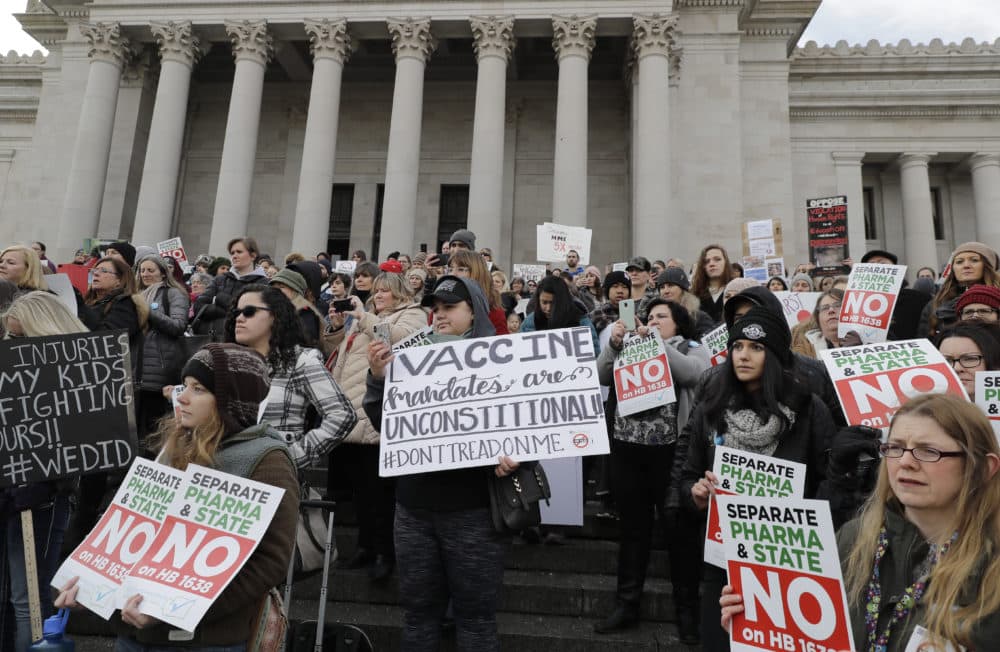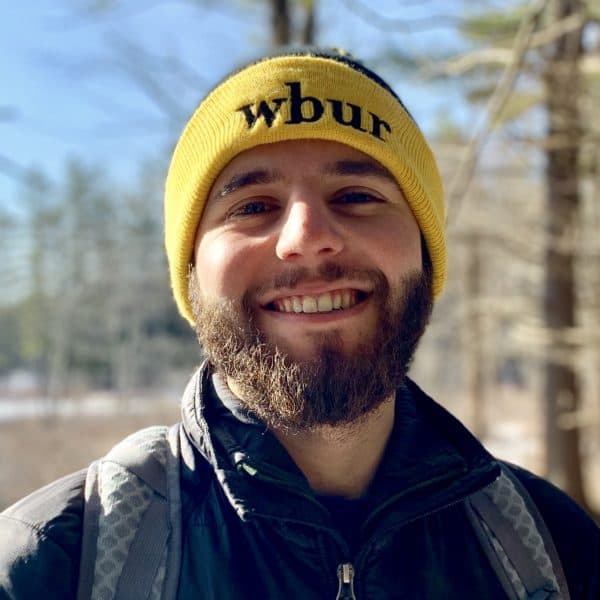Advertisement
Infectious, Part 5: Talk To Me
Resume
Endless Thread presents a special series, "Infectious: The Strange Past and Surprising Present of Vaccines — and Anti-Vaxxers." This is Part Five. Find Part One here, Part Two here , Part Three here, and Part Four here.
Apparently vaccination is a hot issue in 2019. Who knew? One thing that has become abundantly clear to the Endless Thread team while reporting this series is that a lot of people are still struggling to decide whether or not to vaccinate.
One listener from Illinois who identifies as vaccine "hesitant" called in to express frustration with the lack of real dialogue on this topic.
"It's always difficult dealing with the vaccine stuff because anytime someone [expresses] any concern or a side effect of vaccines it’s like, 'Oh no no that could never happen,' even though there's so [many] other medicines that have side effects"
He goes on to say that he and his wife did vaccinate their daughter in spite of their concerns. But their concerns were never sufficiently addressed. So they lingered.
"[It's] not that vaccines as a whole are evil or anything like that. It's just frustrating that it feels like ... anyone that expresses concern is automatically scary and dangerous. And so it's tough to have that discussion."
This lack of discussion matters. It's indicative of a pattern that is pervasive in our modern lives: people choose what to believe and they write the other side off completely. Debates are polarized.
So, in the final installment of Endless Thread's special series on vaccines, "Infectious," the team explores how to talk and how to listen to people with different opinions. Because not talking and not listening has contributed to a modern health catastrophe.
A Communication Breakdown
The overwhelming scientific consensus is that vaccines are beneficial for society. But there are more and more people who are going the other way. One of those people is Ginger Taylor, a known voice in the vaccine hesitant world. She used to be the director of the Maine Coalition for Vaccine Choice, which she describes as "a group of parents who have gotten together just to try to preserve our rights to make our medical decisions for us and for our children."
Ginger's skepticism of vaccination started when her youngest son, Chandler, was diagnosed with autism. In spite of years of scientific evidence to the contrary, she insists that a vaccine caused her son's autism.
"Doctors don't know what's going on. They don't know what's in the products that they're giving. Parents are set up as the dummies and doctors as the experts."
Ginger says her doctor scolded her for even expressing concern in the first place. The effect? Ginger dug in deeper.
Aimee Bernard, an immunologist based in Colorado, thinks about this a lot.
Scientists ... kind of suck at explaining science to people that don't understand science. And I think one of the big problems when people attempt to read scientific literature is that, with all the specialized terms that we use, those are not accessible to people that aren't trained in science. And a lot of times it's really hard for scientists to simplify the way they talk ... And it's something we all need to get better at.
Very Long Odds
Back in January, a Redditor posted to the subreddit Vaxx Happened about his wife falling for quote “anti-vax nonsense.”
A bunch of people responded with their personal stories, including Ian McCall:
Ian was born in 1972 in Sheffield, England. And for the first 10 months of his life, he was a perfectly normal, healthy baby.
"I just look like your perfect happy baby picture that most people would take and put up on the wall somewhere," he said.
But all of that changed when Ian was almost one year old and he was finally old enough to take the oral polio vaccine.
"I threw up the first dosage, being a baby and having no manners whatsoever," Ian says.
Not to be deterred, Ian’s doctor gave him another sugar cube with the vaccine, assuming Ian had just puked it all up the first time. But, the doctor was wrong. So Ian basically got a double dose of vaccine.
End result? Ian contracted polio ... from the polio vaccine.
If that sounds unlikely, that's because it is. According to the World Health Organization, “vaccine-associated paralytic polio,” or VAPP, occurs once in every 2.7 million doses. "But the one in 2.7 million exists," says Ian. "And it was me that time."
Ian spent the next eight or nine months in a rehabilitation unit, fully paralyzed. But then, amazingly, he made a full recovery.
"I suspect, but I don't know, it's because of [how young I was]," he says. "I can't say I have any special insight into why it was me. There were other people in the intensive care unit who did not come out of it. So I think I'm gonna put that one down to luck."
This is all ancient history now. Ian is 47 years old, works in finance, and a dad to three teenagers. In spite of his own history, all three of his kids are fully vaccinated, which he says wasn't an easy decision.
"Actually I was considerably worried. I knew the stats. I knew that this is a beneficial thing. But there's an irrational part of you that thinks well, one in 2.7 million happened so it could happen again."
Science Denial
Lee McIntyre is a philosopher and the author of a new book called The Scientific Attitude: Defending Science from Denial, Fraud, and Pseudoscience. Lee has identified common themes among a number of communities that are questioning science:
I think that the most elemental reason why people deny science is because they don't like what science is telling them. It conflicts with something else, some belief, some ideology that they don't want to give up. I sometimes think of science deniers as cafeteria skeptics. They tend not to be skeptical about everything but they're skeptical about the science that they don't like.
Lee also identifies a concept that’s really important. He says that real science is a process; it's ongoing. "And the trouble is that science deniers tend to exploit that kind of uncertainty."
Lee says science denial is continuing to get worse and worse. And, though you might never convince a hardcore science denier to change their mind, there are more people who are undecided than it may seem at first blush.
"If we're just silent ... I think that a lot more people will become science deniers," he says. "Every lie has an audience. And if the science deniers are just out there spreading their message unchecked I think that there are going to end up being a lot more people who are confused and a lot more potential science deniers in the future."
The Workshops
Lee McIntyre thinks that being open and willing to engage with vaccine skeptics is the best way to encourage more and more people to vaccinate. And the Endless Thread team witnessed this approach be successful first-hand at a workshop in Portland, Oregon led by a nonprofit called Boost Oregon.
Boost Oregon focuses purely on education around vaccines. Their workshops are run by a pediatrician — no stupid questions. In the workshop Endless Thread attended, there were a lot of single parents, a mother who brought her toddler, and a few couples.
There was also a woman there named Albina who was expecting in just a few weeks. She had been scared and overwhelmed by the prospect of vaccination because many in her family had opted out of vaccines and she'd seen a lot of scary headlines on the internet.
Yet after just two hours of asking questions and learning more about the science behind vaccination, Albina was feeling much more confident.
"I feel like my questions were answered. So I definitely have way more peace. And I know that [vaccination] is going to be good for my son."
Further Reading:
"The Scientific Attitude: Defending Science from Denial, Fraud, and Pseudoscience"
